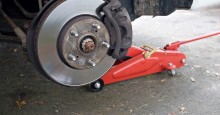
Brake inspection after winter weather
A vehicle’s braking system is vital to safe driving year round.
As you prepare to get on the road this spring, take a close look at your brakes before any long journeys. Winter weather and road conditions can damage brake systems.
Automotive experts suggest getting your brakes checked when you go in for an oil change. Your technician can perform a full inspection and let you know the status of your pads, rotors, and other parts of the system, making the necessary suggestions for replacements and service.
While the durability of brake parts can vary based upon your vehicle make and the manufacturer of the equipment, the life of brake pads and rotors usually ranges from 20,000 and 60,000 miles.
Another good habit is to have your brakes checked whenever you change your tires. Before your scheduled service, hints may pop up that there are potential problems. When they do, you don’t want to ignore the signals.
Brake warning signs
Probably the most obvious sign of a problem is a warning light on your dashboard. Although it may be easy to ignore warning lights, you don’t want to overlook brake warning systems.
Brake-related issues that warning lights could signal are critical issues with your pads or fluid pressure. Or the ABS light indicating that there is a problem with the anti-lock braking system.
If a warning light comes up, make an immediate appointment with your auto service technician.

Brake repair for pads and rotors
Other issues can arise in how your car is performing when you use the brakes:
- Are you noticing you have less braking power?
- When you apply the brakes, does the pedal drop to the floor before engaging? Or feel spongy?
- Are there vibrations when you apply the brakes? Do you feel shimmying or hear strange squealing noises in the car or brake system?
- Is it difficult to press the pedal down? Like it’s locked in place?
- What about the way the vehicle handles? Does the car pull to the side when you apply the brakes?
- Do you notice a hot or burning smell coming from the vehicle when you apply the brakes?
If you experience these issues, you need to get your vehicle checked out immediately.
What will the technician check?
Certified technicians can perform a multiple point check on your entire braking system. They check for wear, damage, and leaks as well as measure the amount of brake pad surface you have remaining.
If your vehicle has spent a lot of time off the road during winter months, there might be a build up of rust that needs to be dealt with or it could be something much more serious.
Brake fluid
Brake fluid is the blood of the braking system. When correctly maintained, the fluid creates pressure in the system that allows your brakes to operate properly.
If the level is low, it can create air gaps in the system that will make your brakes feel soft and not work properly. Over time, your brake fluid can retain moisture in the system, also causing a drop in effectiveness.
You will need to have the system flushed and the fluid replaced for it to be effective again. From time to time, it is also necessary to bleed your brake lines. This gets any trapped air out of the system and allows it to function effectively.
Brake pads and rotors
Constructed of various materials–ceramic, steel, and copper, brake pads make contact with the rotors and allow the friction created to bring your car to a stop.
Brake rotors are the metallic discs connected to your wheels. It is the smooth interaction between rotors and pads that allow your braking system to safely and efficiently stop your vehicle.
Brake pads and rotors wear down during normal use from friction and heat. Ask your service advisor to let you know how much life is left in the brake pads and other parts such as brake discs.
Your car also has brake calipers that house the brake pads and allow them to operate properly. From time to time these calipers wear out or become damaged and you will need to have them replaced.
Brake wear problems
Normal wear and tear occurs for all braking systems. Yet, some driving habits can either extend or diminish life of the brake system parts.
For instance, speeding up to and pressing hard on your brakes at stop signs or traffic lights reduces brake pad life. Save wear and tear on your brake pads and rotors by decelerating gradually and using the brakes less intensely.
Do you ‘ride’ your brakes or drive ‘two-footed’ using one foot on the brake and the other to accelerate? Even light pressure on the brakes causes extra wear on the brake system. It also gives false information to drivers behind you since your brake lights are activated.
Overloading your car with weight also places wear on your brake system. It will take more braking power to slow you down and put undue stress on the pads and rotors.
Regular maintenance will save you money and wear in the long run. By keeping your system in good shape and addressing any problems right away, it will ensure longer life to your brakes, pads, and rotors, and safer roads ahead.
Remember:
- Don’t ignore squealing, squeaking, grinding, or other noises you notice coming from your brake system. Also be attentive to strange smells such as burning.
- Have your brakes serviced regularly. A good habit is to have them checked whenever you have your oil changed or swap out your seasonal tires.
- Your driving habits can affect the wear and tear on your brakes. Don’t slam on the brakes while stopping. Also don’t overload your vehicle or ride your brakes.
- Use a certified technician who can conduct a full brake inspection including pads, fluid, and rotors.
Copyright © 2024 by Sensible Driver. All rights reserved.